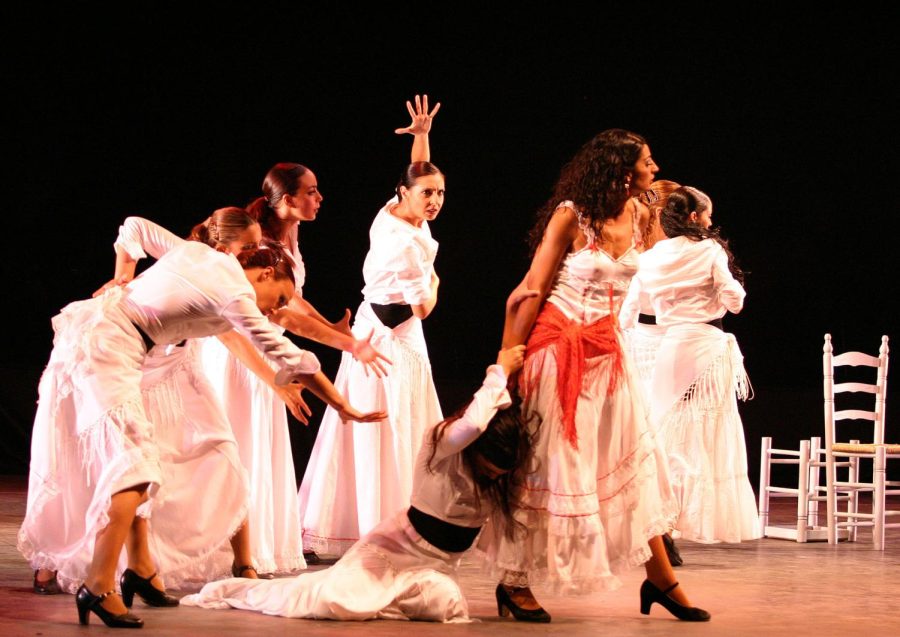The Enduring Romance of ‘Carmen’
Inspiring countless works, Bizet’s final work, “Carmen,” has proven itself to be a timeless romantic classic
POCHI VIA WIKIMEDIA COMMONS
With her deeper vocal range and bold lyrics, Carmen presented a new and liberated take on the love triangle trope.
March 1, 2023
As one scrolls through the seemingly endless film and television libraries, they may realize that it is incredibly difficult to escape romance in film. This prevalent theme extends far beyond the screen, grounding its origins in the earliest forms of art and culture.
The concept of love has inspired generations of artists, writers, filmmakers and musicians to compose powerful works depicting the wonders and tragedies of romance, one of the oldest genres of entertainment. Written in the late eighth or early seventh century B.C., “The Iliad” is a romantic tragedy, in which two protagonists fight over the beautiful female lead, an enduring narrative that influenced countless works of romantic literature, art and music thereafter.
This narrative of tragic romance particularly resonated with Georges Bizet, born Alexandre-César-Léopold Bizet, a 19th-century French composer famous for his most important and final work, “Carmen.”
“Carmen” is a testament to the enduring allure of the theme of romance, albeit tragic romance, that is ever-prevalent in the arts and in reality.
The opera, set in the Spanish city of Seville, tells the story of the titular protagonist Carmen, a mysterious and attractive Romani woman and a time-honored femme fatale, and her love triangle entanglement between the corporal Don José and the bullfighter Escamillo. In true iliadic fashion, tragic romance has been a key theme in opera.
Like “Carmen,” more modern approaches to a love triangle have gained immense traction as well. The films “Gone with the Wind” (1939) and “Twilight” (2008) feature prominent ones. “Carmen,” however, showcases the love triangle motif in a different light by giving the primary love interest (in this case, Carmen) more power than their suitors, a theme which has persisted ever since.
The sultry voice of Carmen is played by a mezzo-soprano, in sharp contrast to the usual soprano female protagonist. This encapsulates Bizet’s vision of the relatable proletarian woman, as mezzo-soprano is the most common voice type for adult women.
Carmen’s verses also suggest a more modern and liberal approach to romance than what society traditionally allowed of women during Bizet’s time. In “Habanera,” or “L’amour est un oiseau rebelle,” Carmen opens the song with the phrase, “l’amour est un oiseau rebelle que nul ne peut apprivoiser,” meaning, “love is a rebellious bird which nobody can tame.” Additionally, in “Près des remparts de Séville,” also known as “Séguedille,” Carmen sings the lines “donc pour me tenir compagnie, j’emmènerai mon amoureux,” meaning “so to keep me company, I will take my lover.”
Through the opera, Carmen is portrayed as the one in control of her romantic situation instead of either of her male lovers, a subversion of the love triangle motif that dominated romantic art, music and literature at the time.
“Carmen” is a testament to the enduring allure of the theme of romance, albeit tragic romance, that is ever-prevalent in the arts and in reality. Beyond his exquisite composition technique and persistent ambition to excellence, Bizet crafted an opera that stood the test of time. “Carmen,” directed by Benjamin Millepied and scored by Nicholas Britell, is slated for release this year as the most recent film rendition of the immortal tale, starring Melissa Barrera as Carmen and Paul Mescal as Aiden, the male love interest.
“Carmen” served as the inspiration for multiple films, including “The Wild, Wild Rose” (1960, Hong Kong), “Carmen Get It!” (1962, Czechoslovakia), “Man, Pride and Vengeance” (1967, Italy) and “First Name: Carmen” (1983, France). .
Carmen herself has been portrayed by some of history’s greatest actresses and performers, including Dorothy Dandridge, Grace Chang, Beyoncé Knowles and Rita Hayworth.
Today, “Carmen” continues to inspire, as recently as the Belgian artist Stromae’s modern rendition of the opera’s most popular melody, “Habanera,” in his eponymous song “Carmen.” Lana Del Rey’s, Fordham College at Rose Hill ’08, “Carmen” also references the titular protagonist of Bizet’s opera and portrays Carmen as someone or something that is desired. Both Stromae’s and Del Rey’s songs retell the key themes of the perils of romance and desire.
The tale of Carmen is a definitive tale of romance and a reflection of our weakness in the face of what has commonly been known as the most powerful emotion.















